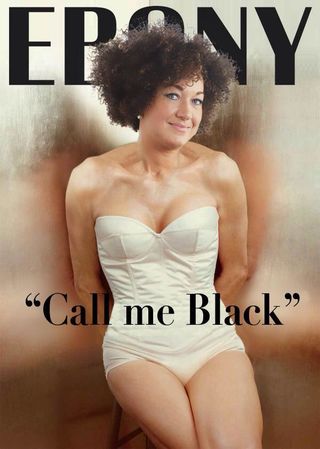Identity
Blasphemy!
If you go down to the university today, you aren't sure of a big surprise.
Posted May 9, 2017
It has been a week of blasphemy, both religious and secular. In the secular realm, philosopher Rebecca Tuvel got taken to task by a posse of hundreds of concerned citizens—some styling themselves as part of the editorial team of the journal—calling for her head. (1) It was immediately obvious that few (if any) had actually read her paper. This was not about to stop them calling for retraction, penance, careers ending. Why the outrage? Dr Tuvel’s paper “In Defence of Transracialism” (in the feminist journal Hypatia) had dared to suggest that the same reasoning that allows Caitlyn Jenner to establish her identity as a woman, should allow Rachel Dolezal (ex-head of the NAACP) to establish her identity as a black person. (2) In the religious realm, we have just heard that Gardaí are not, in fact, going to prosecute Stephen Fry for blasphemy. (3) This comes two years after an Irish interview in which he said to Gay Byrne (among other things) “'Why should I respect a capricious, mean-minded, stupid God who creates a world which is so full of injustice and pain?' (4)
Yes—you heard that right. In 2017, let the record show that in a western civilisation (and, incidentally, my adopted home) it was being seriously considered that a person be prosecuted for blasphemy. I’m not talking about the Indonesian governor Ahok, who has just been sentenced to two years for blasphemy. I’m not even talking about the hideous vigilante gangs in Bangladesh and Pakistan hacking up atheist bloggers. (5) This is blasphemy in Ireland. Where I live. And teach. And teach blasphemous things, possibly—but I’ll come to that in a minute.
Incidentally, what we are talking about in Ireland is not some ancient medieval hangover of a law either. Not one of those embarrassing, “Oh I see sir, it turns out that according to this tattered piece of vellum you really do have the right to molest goats on the Sabbath while crossing Cork City’s famous Wobbly Bridge. My mistake. Do carry on”. No. Ireland (yes, the same Ireland that became the first country to establish gay marriage by landslide popular vote in 2015) introduced a blasphemy law in 2009, ratified in January 2010. So this is a shiny new law getting its first unboxing. (6)
In the case of Rebecca Tuvel, the actual Hypatia editor Sally Scholz (as opposed to the hundred and fifty-odd, and I do mean odd, signatories to the letter attacking her) have, more or less, told her detractors to get stuffed. (7) No retraction of paper. No apologies. No tarring and feathering. If you want to argue with her, you are going to have to pull up your big girl pants and do it properly. Maybe by trying to rebut her arguments, because the howls of protest and special pleading imply that you can’t.
Good for Hypatia (not that they’d thank me for saying so, I’d hazard a guess). Tuvel’s article (mostly) said what everyone outside of a highly rarefied sphere already recognised as rather obvious. Namely—if you deny the influence of biology on human identity (which post-modernists appear to be committed to, for reasons too tedious and wrongheaded to concern ourselves with now) then you have no grounds to mock Rachel Dolezal for denying that she’s a white person, merely because she had white parents. By parity of reasoning about the grounds of Caitlyn Jenner’s identity—the details of which she herself has made exhaustively public—Rachel Dolezal should be granted similar licence to declare herself whatever she chooses. But Dolezal was mocked, while Jenner was and is applauded.

Being as this was a somewhat politically correct philosophy paper (and philosophers like to turn ideas around several times before putting them back down again) Tuvel took fifteen pages to say this. Not that this appeased her attackers, who did their best to derail her career. They didn’t have much in the way of argument. Instead they had innuendo, invective, howls of victimisation (but no actual victims). In other words, they accused her of “Blasphemy”. Well, they failed to make this stick, but the fact that they tried tells us a lot about the importance of protecting civilised spheres of discourse from mob rule.
What about Stephen Fry and his blasphemy charge? The fact that Gardai have decided not to prosecute Stephen Fry is, I’m afraid to say, an attack on freedom of speech. How so? It has taken them nearly two years to bring this investigation and they have decided (finally) not to, because they could not find enough people who were offended. Oh really? So, the next time if enough of a posse can be rounded up to be offended then a prosecution might go through? This is inviting mobs to start howling at anything they happen not to like, and then backing this howling with the rule of law. There are a lot of good reasons not to sanction this. Here are some:
If the last few years of internet have taught us anything, it’s this: The sort of mob mentality that allowed behaviors from the gleeful humiliation of transgressors in the medieval village pillory, through to the torturing to death of victims in lynchings, was just lying dormant in human beings. We had not outgrown it—just given it new forms. Twitter pile-ons. Attempts to get people sacked for voicing unpopular opinions. Doxxing. Rape threats. Death threats. Back in 2015, Jon Ronson wrote about this extensively in “So You’ve Been Publicly Shamed”. (9) In this he details, among many others, the case of Justine Sacco, a woman with all of 170 Twitter followers, flying to South Africa. Having penned an easily mis-interpretable joke on Twitter, and now on a long-haul flight, by the time she had landed a gleeful worldwide mob had already got her sacked by a fearful employer. With happy sadism this mob then detailed someone to photograph the look on her face as she emerged in the airport concourse, turned on her phone, and discovered what had been done to her.

That mob mentality is ugly is not exactly news. But there is an even deeper issue here. Over the centuries we have developed mechanisms to allow multiple (perhaps unpopular) voices to be given fair hearings. We do not simply decide answers by a show of hands. Might does not make right. Partly this is a recognition that science and philosophy are not common sense. In many cases discovering what is true or what is wise run counter to common sense. The process might even, perhaps even sometimes should, annoy people. Learning is not always fun. So we protect those that try. If University is to have safe spaces, then it should be safe to be wrong. And, we accept that the process is imperfect, and we build lots of give in the system so that ideas can be explored fairly without individuals fearing for their lives or careers if they happen to misspeak. We do it all according to rules—like boxers having a fair fight rather than a free-for-all. The call of “blasphemy” is a refusal to engage, for fear that you might lose.
And that is why we have developed mechanisms for dealing with disputes and for protecting minorities. “It’s the will of the people” shout a bunch of people who want to do something horrible. Well, that’s not good enough. There are protections for minorities, and it doesn’t matter a damn if you are in the majority. It gives you no moral authority in enquiry. In the same vein, someone might produce a philosophical piece that unsettles a group of people enough that they pen a long list of them being offended. I’ve got a better idea—why don’t just one of you write something rebutting the arguments. If you can. If you can’t rebut the arguments then “being offended” is no more relevant than “being rich”, or “being short”, or “being from Droitwich”. Nobody cares if you are offended. Offence in itself is not an argument (although exploring why offence is felt or given might be…it depends). Join the argument in civilised fashion or get out of the way. Tuvel was obeying the rules, and attempting to bend language into saying that she committed “violence” and “harm” does damage to the institutions that allow honest inquiry to proceed. She was doing her job. Makes you uncomfortable? Even better.
Closer to Home
So—confession time. Stephen Fry might have escaped prosecution for blasphemy because he did not outrage enough people. However, what he said in his interview is pretty standard fare in philosophy. It’s known in the trade as the Problem of Evil. Long argument short—if God can do all things, and is all loving why is the world self-evidently filled with manifest unpleasantness? And, one standard theological response to this thought is the Freewill reply. Once again (very roughly), that God let humans do as they liked and everything went wrong from there.
Now, God is not on my syllabus—I’m a psychologist, not a theologian. But Freewill most certainly is on the syllabus, because a lot of neuroscientists think that it’s an illusion. As it happens, I’m not one of them, but that’s beside the point. My job is to fairly present the arguments for and against positions in their strongest forms, and encourage the students to attack and defend said positions. In the business this is called “Steel-manning” and it’s the opposite of “Straw-manning” (presenting a weak bogus form of your opponent’s argument). If you can defeat the strongest form of an argument, then you have made real intellectual progress. Now, if I (and fellow psychologists) present Freewill arguments (for and against) are we going to be de facto guilty of blasphemy? What if a student succeeded in proving that freewill was illusory? Oooerr. Very worrying. Or could we only be breaking the law if enough people get outraged…or enough students do not like their grade? Ugly scenes could break out in the quad. Uglier even that during Fresher’s week.
Incidentally—let me be utterly clear about this. Arguments at university and the wider intellectual community are meant to be unsettling. That is what you pay us to do. If this stuff was common sense, then it would not have been hard fought over centuries with thousands of missteps (and no doubt many current errors) to achieve it. The process of working through one’s own prejudices, common-sense attitudes (which are a poor guide to truth), cultural assumptions, and misunderstandings is painful. It’s meant to be painful. Like the gym is meant to be painful. This individual pain, mirrors the pain of millennia of cultural battles fought to attain the state of imperfect knowledge that we have managed so far. And it isn’t (and wasn’t) decided by what the mob wants to comfort it.
Ever since Socrates was sentenced to death by what was effectively a mob, reflective folk have been rightly suspicious of the notion that we should decide the truth by counting hands, the idea that “might makes right”. Or, to give it its modern formulation, “The will of the people”. The will of the people was no friend to scientific icons like Gallileo. But it was no friend to religious icons like Jesus, for that matter. As for the original Hypatia: She was a famous Alexandrian philosopher who was ripped to death (by oyster shells, according to some classical sources) for offending a mob. The fact that a writer in the modern journal Hypatia was attacked by a sanctimonious mob is an irony too delicious to not mention. I guess we should just be thankful that they did not have any oyster shells with them...
I'll leave the final word on offence-mongers to Stephen Fry himself.
Update
On October 26th, 2018 Ireland voted (by 65% to 35%) to revoke the law on blasphemy.
References
1) Jesse Singal http://nymag.com/daily/intelligencer/2017/05/transracialism-article-con… He goes into the detail of the evidence that the detractors cannot even have read the paper. I won’t rehash his arguments but they can all be found here
2) Tuvel In Defence of Transracialism http://onlinelibrary.wiley.com/doi/10.1111/hypa.12327/full
4) Stephen Fry Gay Bryne https://www.youtube.com/watch?v=-suvkwNYSQo
5) https://www.theguardian.com/world/2017/may/09/jakarta-governor-ahok-fou…
http://www.newyorker.com/magazine/2015/12/21/the-hit-list Bangladeshi viglante attacks
https://www.independent.co.uk/news/media/press/pakistani-printers-remov…
7) http://leiterreports.typepad.com/blog/2017/05/editor-of-hypatia-rebukes… A copy of Scholtz response can be found here
8) http://www.independent.ie/style/celebrity/celebrity-news/caitlyn-jenner… I mention this merely because one of the crimes Tuvel was accused of was “deadnaming”; the offensive reporting of person’s name before transitioning. Caitlyn Jenner has been absolutely explicit about how this, in her own case (Tuvel mentions no other) is something that she herself does repeatedly. E.g. “He still lives inside me. I still do a lot of the things old Bruce used to do. I still fly airplanes and go race cars once in a while. I can have the best of both worlds," said the 67-year-old.”
9) Ronson, J. (2016). So you've been publicly shamed. Riverhead Books (Hardcover).




